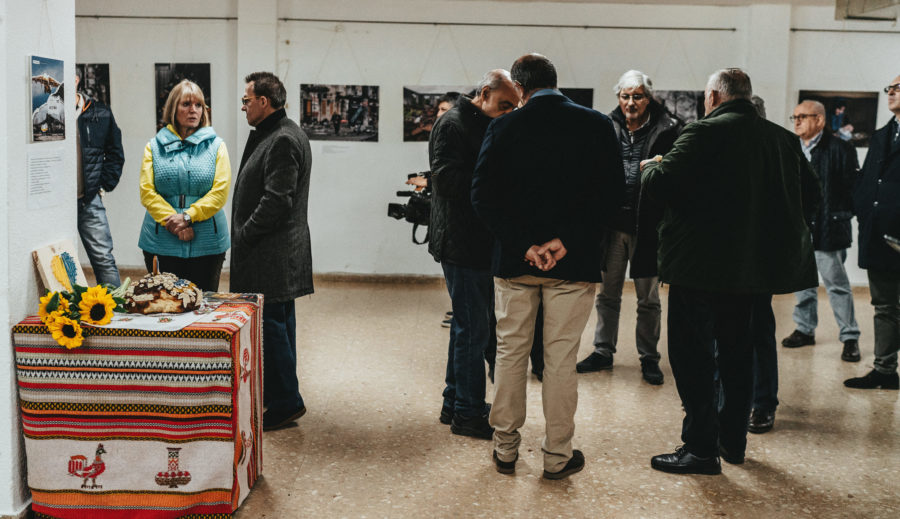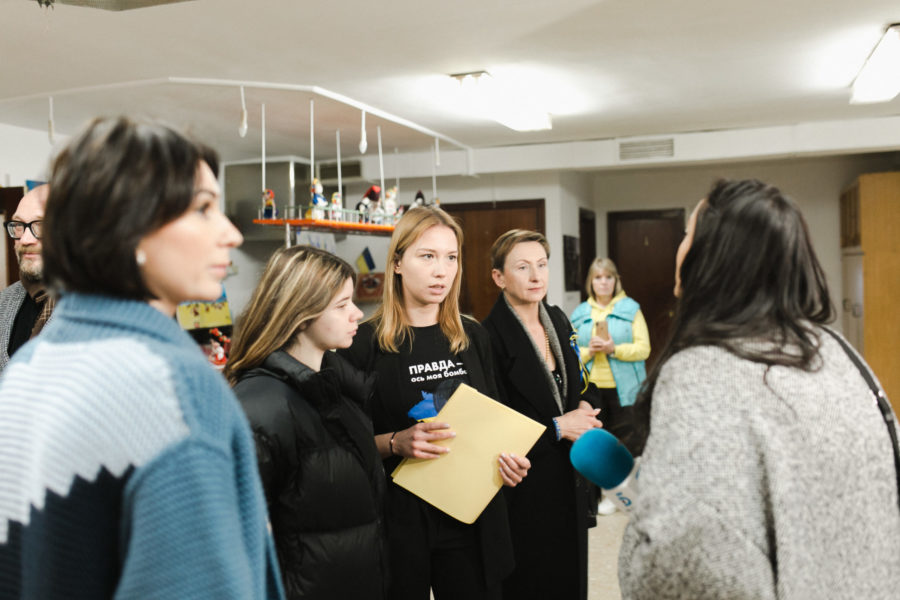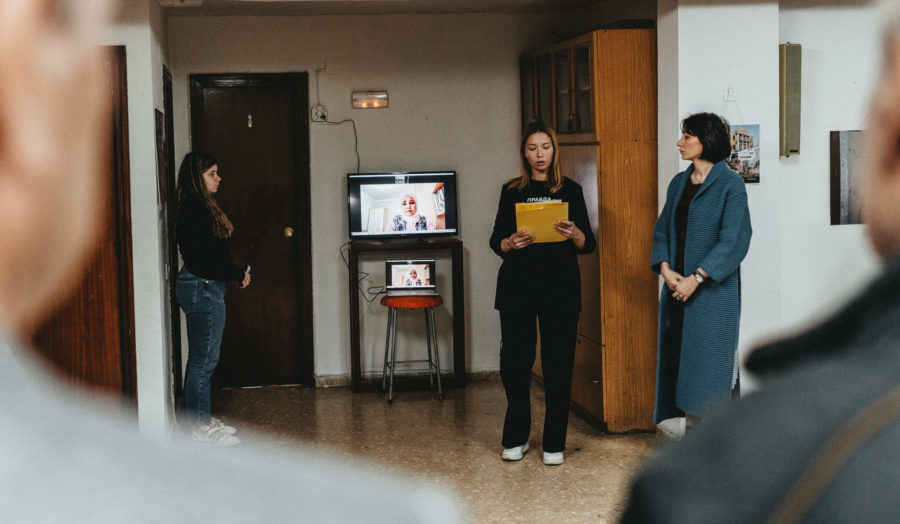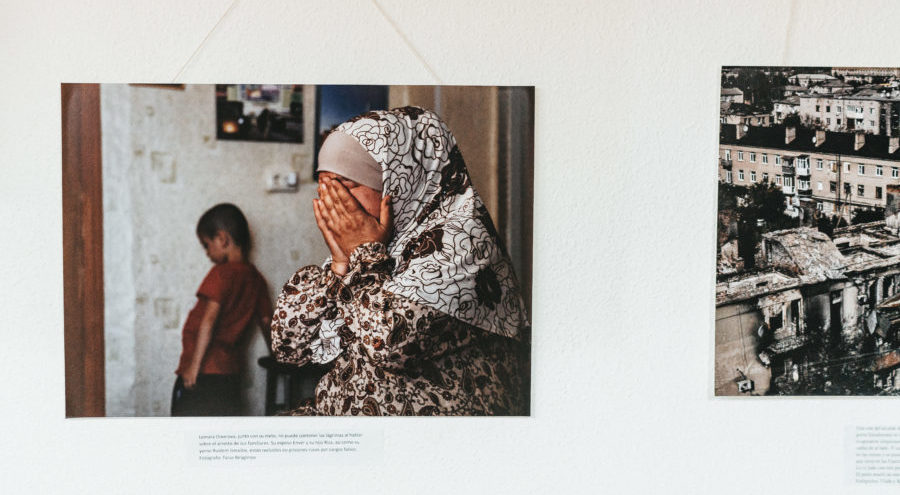ZMINA joins photo exhibition in Valencia on the tragic anniversary of the Russia’s full-scale invasion of Ukraine
On 24 February, 2023, on the tragic anniversary of the full-scale Russian aggression against Ukraine, Human Rights Centre ZMINA participated in the opening of the photo exhibition about Ukraine, organized by the NGO “Damark” in Valencia, Spain. Ukrainian civil society presented the photos of horrors, Russians have been committing in Ukraine not only during 2022 but since 2014, to the politicians, journalists and activists.

The photo exhibition was opened to public on 23-25 February and was constructed from different parts: beauties of Ukraine, comparison between peaceful past and brutal present, destruction of Ukrainian cities by Russian soldiers. The exhibition has also included the photos from the occupied Crimea made by Alina Smutko and Taras Ibragimov – the photographers, who covered human rights violations in occupied Crimea and documented lives of political prisoners’ families in 2014-2019, and were banned from entering the occupied Crimea and the Russian Federation for their journalistic activities.
“Exactly one year ago, the Ukrainian people were awakened by air raid sirens and bombings. At 5 AM a full-scale war began, a brutal, unjust and illegal invasion of Russia into the Ukraine. But I am here to remind you that this horror started not on February 24, 2022, but 9 years earlier – on February 20, 2014, with the illegal occupation of Crimea. Currently, there are around 150 people arrested for political reasons in Crimea, because they oppose the Russian occupation. The Russian occupation “authorities” try to intimidate the population by arresting journalists and activists, persecuting Ukrainians and indigenous people – Crimean Tatars, shutting down independent media,” emphasized the International Advocacy Officer of Human Rights Centre ZMINA Tetiana Zhukova during the opening of the exhibition.

“Searches in houses and mosques, intimidation, various types of pressure, administrative fines, arrests became commonplace in Crimea. FSB officers come to the homes of peacefully sleeping people, scare children, blockade entire blocks around their houses, and do not allow access to lawyers. There are dozens of cases of people suffering from electric shocks in law enforcement buildings. Criminal cases are brought against civilians, and falsified criminal offenses are attributed to them – terrorism, sabotage, extremism,” added Lutfiye Zudieva, respresentative of the “Crimean solidarity” initiative and Crimean human rights activist.
She emphasized that is it a long-lasting practice: Crimean Tatars have already been on the verge of extinction twice in their history — during the years of the tsarist regime and during the years of the Soviet Union. In the 18th century, more than 500,000 Crimean Tatars left Crimea due to religious and political repressions. In the 19th century, by the decision of Joseph Stalin, a whole nation was expelled from their native lands. 250 thousand Crimean Tatars were resettled in Central Asia. Half of them perished from starvation and disease. 2014 brought new threats.

There are arounf 150 political prisoners in Crimea, 15 of whom are journalists: Crimean Tatar journalists of “Crimean Solidarity”, freelancer of “Radio Liberty” Vladyslav Yesypenko, journalist of “InZhyr-Media” and “Crimean Process” Iryna Danylovych, journalist of the Crimean Tatar newspaper “Avdet” Asan Akhtemov, deputy editor-in-chief of the magazine “Black Sea Security” Oleksiy Bessarabov. One fifth of the list of political prisoners are elderly people with severe diagnoses and people with disabilities, in particular Halyna Dolhopola and Azamat Eiupov, highlighted the human rights defenders.
 Photo taken by Taras Ibragimov
Photo taken by Taras Ibragimov“Russia has neglected the UN Charter, obligations under the Budapest Memorandum and all the possible principles of international law: used force and started aggression against sovereign state, brutally violated borders, tries to eliminate self-determination of peoples and constantly impudently violates human rights on the occupies territories,” stated Lucia Zadorozhna, Head of the NGO “Damark”.
“However, each of us has power to change this situation of impunity: reacting to each rendered verdict and demanding the immediate and unconditional release of all political prisoners, publicizing stories of the victims of Russian aggression against Ukraine, including political prisoners, initiating negotiation processes on the extradition of political prisoners and civilian hostages with the involvement of Ombudsmen, paying constant attention on the situation in Ukraine, especially temporarily occupied Crimea, and supporting Ukraine in all possible ways,” concluded Lutfiye Zudieva.
If you have found a spelling error, please, notify us by selecting that text and pressing Ctrl+Enter.















